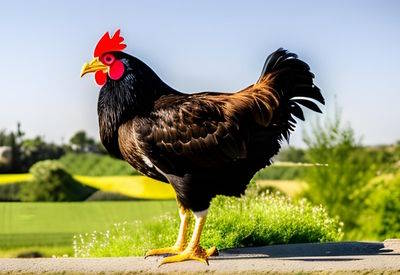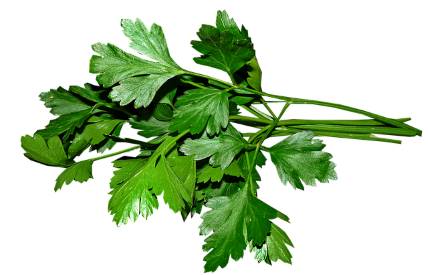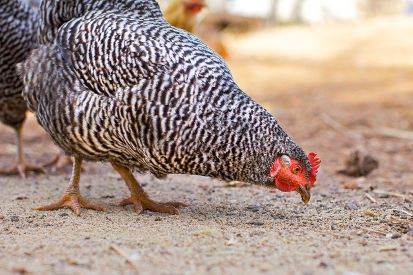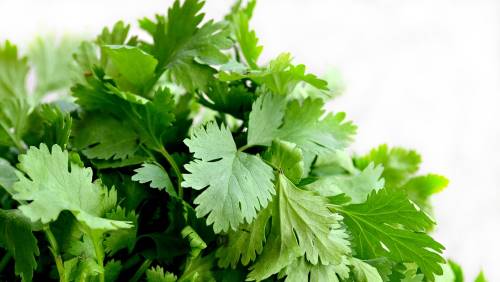Are you a proud chicken owner looking for a fun and healthy treat for your feathered friends? Well, today’s your clucky day! In this article, we’ll explore the wonderful world of parsley and, more importantly, answer the question: can chickens eat parsley?
That’s right; it turns out that this vibrant green herb is not only a delicious addition to our meals but can also provide some fantastic benefits for our chickens. So, let’s dive into all things parsley and discover how it can delight your flock and contribute to their well-being.

Can chickens eat parsley?
Absolutely! Chickens can eat parsley, and they will likely enjoy it too! Parsley is a versatile herb that adds flavor to our dishes and serves as a fantastic snack for our feathered friends. So, if you’re a chicken owner, homesteader, or farmer, don’t hesitate to treat your chickens to a parsley feast once in a while.
As with any treat, providing a balanced diet to your chickens is essential, but a little parsley here and there can be an enjoyable and nutritious addition to their meals.
[ChickenAffiliate]
The benefits of eating parsley for chickens
Parsley offers many benefits for your chickens, making it an excellent choice for a treat or supplement. Some of the most notable advantages are included below.
High in vitamins and minerals
Parsley is packed with vitamins and minerals essential for your chickens’ health, such as vitamins A, C, and K, as well as minerals like iron, calcium, and potassium. These nutrients are vital in maintaining your chickens’ immune system, bone health, and overall well-being.
Antioxidants
Parsley is rich in antioxidants like flavonoids, carotenoids, and vitamin C. Antioxidants help neutralize free radicals in the body, protecting your chickens from cell damage and supporting their overall health.
Boosts egg production
The high levels of vitamins and minerals in parsley can contribute to better egg production and quality. Chickens with a well-balanced and nutritious diet are more likely to produce eggs with strong shells, vibrant yolks, and higher nutritional value.
Natural dewormer
Some studies suggest that parsley can be a natural dewormer for your chickens. Its antiparasitic properties can help keep your flock healthy by preventing internal parasites.
Things to watch out for when feeding parsley to chickens

While parsley is generally safe and beneficial for chickens, there are a few things to watch out for when incorporating it into their diet.
Moderation is key
As with any treat, it’s important not to overdo it. Too much parsley can lead to an imbalance in your chickens’ diet, negatively impacting their health. Be sure to provide a variety of treats and supplements in moderation to maintain a well-rounded diet.
Pesticides and herbicides
If you’re not growing your parsley, be cautious about the source. Commercially grown parsley can contain pesticides and herbicides, which can harm your chickens. To avoid this risk, opt for organic parsley or grow your own in a pesticide-free environment.
Oxalates
Parsley contains oxalates, which can bind to calcium and interfere with calcium absorption when consumed in large amounts. While small amounts of parsley shouldn’t pose a problem, excessive consumption can lead to a calcium deficiency in your chickens, potentially affecting their egg production and bone health.
How often should chickens eat parsley?
Chickens can enjoy parsley as an occasional treat, but it should not make up a significant portion of their diet. Aim to offer parsley no more than once or twice a week, ensuring their primary food source remains a balanced and complete chicken feed. Providing a variety of treats and supplements in moderation will help maintain a well-rounded diet for your flock.
How to prepare parsley for feeding to chickens

Preparing parsley for your chickens is simple and straightforward. Follow these steps to ensure your flock can safely enjoy this tasty treat.
Wash the parsley
Rinse the parsley under cold water to remove any dirt, debris, or potential pesticides. If you’re using store-bought parsley, consider soaking it in water and vinegar to remove any residue before rinsing it thoroughly.
Chop the parsley
Chickens have small beaks and prefer bite-sized treats. To make it easier for your flock to enjoy the parsley, chop it into small pieces. This will also help to prevent any choking hazards.
Mix it with other treats
Combine the chopped parsley with other healthy treats, such as chopped vegetables, fruits, or other herbs, to create a diverse and exciting snack for your chickens. This will make the treat more appealing and provide a range of nutrients to support their overall health.
Offer the parsley
Scatter the chopped parsley or parsley mixture on the ground, in a treat dish, or mix it into their regular feed. This will encourage natural foraging behavior and provide mental stimulation for your chickens.
Monitor consumption
Keep an eye on how much parsley your chickens are consuming. As mentioned earlier, moderation is essential. Ensure your chickens eat a balanced diet and do not overindulge in treats like parsley.
Can baby chickens eat parsley?
While baby chickens, also known as chicks, can technically eat parsley, it’s best to wait until they are older before introducing it into their diet. Chicks have different nutritional requirements than adult chickens, and their primary food source should be a high-quality, specially-formulated chick starter feed.
Once your chicks are around 8 to 10 weeks old and have transitioned to a grower feed, you can gradually introduce treats like parsley into their diet. Start with small amounts and ensure the parsley is finely chopped to prevent choking hazards. Monitor your chicks closely to ensure they tolerate the new treat well and adjust accordingly.
What other herbs can chickens eat?

Parsley is not the only herb that your chickens can enjoy! Many herbs can benefit your flock, providing various health benefits and adding variety to their diet. Here are five more herbs that your chickens will love.
Cilantro
Cilantro, also known as coriander, is a popular herb chickens can safely consume. Packed with antioxidants, vitamins, and minerals, cilantro can help support your chickens’ immune system, digestion, and overall health. Additionally, cilantro contains natural antibacterial properties, which can help protect your flock from harmful bacteria.
Read More: Can Chickens Eat Cilantro? 6 Important Benefits
Basil
Basil is another fantastic herb option for chickens. Rich in vitamins A, C, and K, as well as essential minerals like iron and calcium, basil can contribute to the overall well-being of your flock. Basil is also known for its anti-inflammatory and antioxidant properties, which can help support your chickens’ immune systems and protect them from cell damage.
Read More: Can Chickens Eat Basil? 5 Fantastic Benefits
Rosemary
Rosemary is a flavorful herb that your chickens can enjoy, and it comes with several health benefits. Rosemary contains antioxidants and anti-inflammatory properties, which can help protect your flock from disease and inflammation. This aromatic herb is also known to help with respiratory health, making it a great addition to your chickens’ diet, especially during the colder months.
Read More: Can Chickens Eat Rosemary? 5 Amazing Benefits
Mint
Mint is an excellent herb choice for chickens, as it offers a refreshing taste and a variety of health benefits. Mint has natural insect-repelling properties, which can help keep pesky bugs away from your flock. Moreover, mint is known for its digestive benefits, as it can help soothe upset stomachs and promote overall digestive health in your chickens.
Read More: Can Chickens Eat Mint? 5 Amazing Benefits
Lavender
Lastly, lavender is another delightful herb that your chickens can safely consume. Apart from its lovely aroma, lavender offers several health benefits for your flock. It has calming and stress-relieving properties, which can help keep your chickens relaxed and content. Lavender is also known for its antiseptic and anti-inflammatory properties, making it a great addition to support your chickens’ overall health.
Read More: Can Chickens Eat Lavender? 4 Excellent Benefits
Incorporating these herbs into your chickens’ diet can provide them various health benefits while adding excitement to their meals. Remember to offer herbs in moderation and ensure your flock’s primary diet consists of a balanced and complete chicken feed.
Can chickens eat parsley – final thoughts
In summary, the answer to the question, “can chickens eat parsley?” is a resounding cluck-yes! Not only do chickens enjoy munching on this flavorful herb, but it also provides numerous health benefits, such as essential vitamins and minerals, antioxidants, and the potential to boost egg production.
Remember to serve parsley in moderation, watch out for any potential issues like pesticides or calcium absorption, and ensure your little chicks are old enough to enjoy this treat.
With all this knowledge, you can confidently sprinkle some parsley into your flock’s life, knowing you’re providing them with a tasty and nutritious snack. Happy pecking!
Related Articles:
